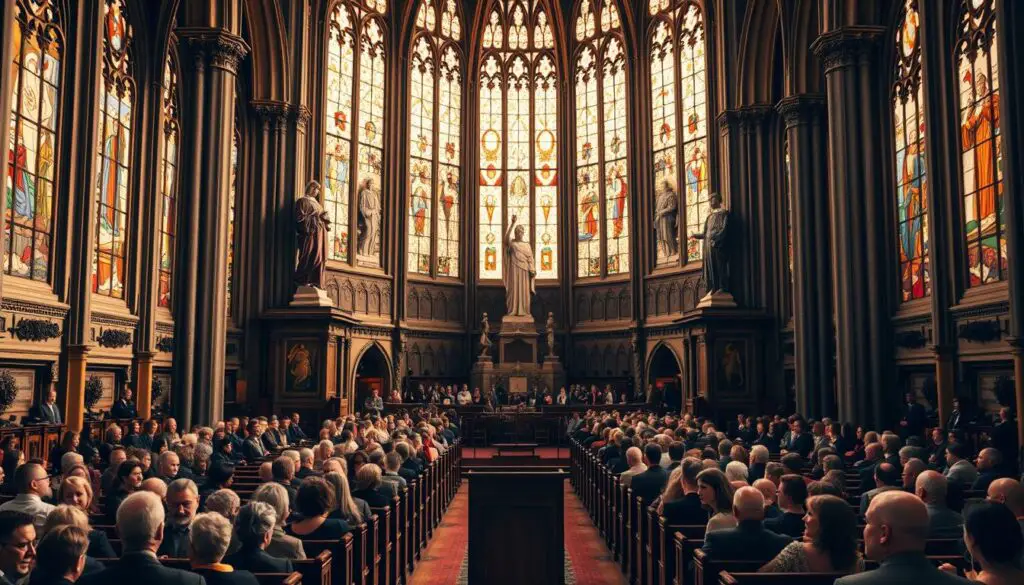With roots stretching back to the 1600s, this faith tradition has grown into one of the largest Protestant groups worldwide. Known for its emphasis on personal commitment, believers affirm their dedication through immersion baptism—a symbolic act central to their identity. Today, millions gather in congregations across Alabama, Britain, and beyond, united by shared values.
The name “Baptist” emerged from early leaders like John Smyth and Thomas Helwys, who championed religious freedom and scripture-based teachings. Their legacy lives on in communities that prioritize local autonomy while upholding core principles. Biblical authority remains foundational, with a focus on Jesus Christ’s teachings guiding daily life.
Though practices vary between congregations, common threads include believer’s baptism and a commitment to evangelism. Over 40 million members worldwide reflect its enduring appeal. Whether exploring doctrinal nuances or historical milestones, this guide offers clarity for curious readers.
Key Takeaways
- Originated in the 17th century with a focus on individual faith and immersion baptism.
- Grew globally, with strong communities in the U.S. (like Alabama) and Britain.
- Emphasizes scripture as the ultimate authority and Jesus Christ’s teachings.
- No centralized structure—each congregation governs itself.
- Over 40 million members participate in diverse worship styles worldwide.
History and Origins of the Baptist Movement
In 1609, a group of English exiles in Amsterdam made a bold decision that would spark a global spiritual legacy. John Smyth, a former Anglican minister, performed self-baptism—a radical act rejecting infant sacraments. This event marked the birth of congregations built on voluntary faith, where only committed believers joined through personal choice.
Founding Figures and Early Beliefs
Smyth and fellow reformer Thomas Helwys championed two groundbreaking ideas: biblical authority over tradition and soul freedom. Fleeing persecution as nonconformists, they established the first Baptist community in Holland. Their 1611 confession declared, “The magistrate is not to compel men to this or that form of religion”—a revolutionary stance in an era of state-controlled churches.
Early communities faced harsh penalties for rejecting infant baptism and Anglican practices. By 1612, Helwys returned to England, founding the first permanent congregation there. These pioneers insisted that local churches govern themselves, free from external hierarchies.
Evolution Through the Centuries
By the 1640s, two distinct streams emerged. General Baptists emphasized Christ’s sacrifice for all people, while Particular Baptists taught salvation for the elect. Despite divisions, both groups shared core commitments to Scripture and believer’s baptism.
The 19th century brought unity efforts, like the 1891 Baptist Union of Great Britain. Today, over 400 years later, their legacy thrives in diverse global communities. From underground meetings to worldwide influence, this movement’s resilience continues shaping modern spiritual landscapes.
Core Doctrines and Beliefs
At the heart of this faith tradition lie foundational principles shaping both individual lives and community practices. These teachings unite diverse congregations while allowing flexibility in local expression.

Biblical Authority and Regenerate Church Membership
Scripture alone guides decisions and doctrines here. Every teaching traces back to biblical foundations, with leaders often quoting verses like 2 Timothy 3:16: “All Scripture is breathed out by God.”
Membership isn’t automatic. Individuals must first demonstrate personal commitment through a heartfelt confession. This ensures communities consist of those actively living out their faith.
Baptism by Immersion and the Priesthood of All Believers
Full-body immersion symbolizes spiritual rebirth, mirroring New Testament examples. It’s not just ritual—it’s a public declaration of inner transformation guided by the Holy Spirit.
Every believer holds equal access to divine connection. No special titles or mediators are needed. This empowers members to lead prayers, teach, or serve based on their gifts.
Local congregations govern themselves, preserving these values without external control. From choosing leaders to organizing outreach, autonomy strengthens shared beliefs while fostering unity in purpose.
What Religion is Baptist Church: A Closer Look
From spirited gospel choirs to modern worship bands, congregations thrive through shared convictions while embracing local creativity. This balance of unity and flexibility defines their approach to spiritual life.
Self-Governed Communities, Shared Convictions
Each congregation operates independently, making decisions through member votes. This autonomy allows communities to address local needs while upholding core principles like believer’s baptism. As one pastor noted, “We answer first to Scripture, then to our members.”
No central authority dictates policies. Instead, voluntary associations provide resources while respecting each group’s sovereignty. This structure traces back to early commitments separating church state influences.
Expressing Faith Through Diverse Lenses
Sunday services might feature pipe organs and hymnals or electric guitars and projectors. Some emphasize expository preaching, while others prioritize interactive Bible studies. These variations reflect the priesthood of all believers—a principle empowering laypeople to shape worship styles.
Despite differences, certain practices unite them. Immersion baptism remains a universal rite, symbolizing personal commitment. Shared meals and outreach programs further strengthen communal bonds across cultural contexts.
Baptist Influence on Religious Liberty and Community Values
For centuries, faith communities have shaped societies by championing freedoms many now take for granted. Among these groups, one movement stands out for its relentless advocacy of conscience rights and civic responsibility.

Separation of Church and State
Early leaders like Roger Williams argued that mixing government power with spiritual matters corrupts both. His 1636 Rhode Island colony became a safe haven for dissenters—a radical idea then. This principle later influenced America’s First Amendment, ensuring no state religion could dominate.
Modern organizations like the Baptist Joint Committee continue this mission. They’ve defended students’ right to wear religious symbols in schools and challenged laws favoring specific faiths. “Freedom flourishes when institutions remain distinct,” explains a recent policy statement.
Embracing Freedom and Individual Soul Competency
The belief that every person can connect with the divine without intermediaries fuels grassroots activism. Volunteers often lead local efforts—from food drives to voter education—guided by love for neighbors.
Consider the Ethics & Religious Liberty Commission’s global work. They partner with groups worldwide to protect minorities facing persecution. Their approach? Empower individuals through education while respecting cultural differences.
- Historic court cases defending conscience rights
- Interfaith alliances promoting peacebuilding
- Youth programs teaching civic engagement
Conclusion
This exploration reveals a vibrant tradition shaped by four centuries of conviction. From Amsterdam exiles to Alabama congregations, communities thrive through believer’s baptism and self-governance. Immersion rituals mirror the New Testament model, while local autonomy preserves each group’s unique voice.
Central to this journey stands biblical authority. Scriptures guide daily choices, fostering personal connections with Jesus Christ and the Holy Spirit. These relationships empower individuals—whether leading prayers or organizing outreach—to live their faith actively.
Religious freedom remains a cornerstone. Early battles for church-state separation laid groundwork for modern liberties. Today, churches balance tradition with innovation, blending hymns with multimedia or hosting community meals alongside worship.
As you reflect, consider how shared values unite diverse groups. Whether studying historic confessions or visiting local congregations, discover how timeless principles adapt to serve modern believers. Every person’s spiritual path contributes to this living legacy—a testament to unity through sacred individuality.
FAQ
How do Baptists view the role of Scripture in their faith?
Baptists emphasize biblical authority, believing the Bible is the ultimate guide for beliefs and practices. They prioritize personal study and interpretation, trusting individuals to engage directly with God’s Word through the Holy Spirit.
Why is congregational autonomy important in Baptist churches?
Each local congregation governs itself independently, reflecting a commitment to self-governance and freedom from external hierarchies. This autonomy allows communities to adapt practices while maintaining core doctrines like believer’s baptism.
What distinguishes baptism practices among Baptists?
Baptists practice immersion as a public declaration of faith, symbolizing Jesus’ death and resurrection. This differs from traditions that sprinkle or pour water, emphasizing a conscious choice to follow Christ.
How do Baptists approach religious freedom?
Historically, Baptists championed separation of church and state, advocating for individual liberty to worship without government interference. This principle stems from their early struggles for recognition and equality.
Do Baptist beliefs vary between congregations?
While core doctrines like salvation through Christ remain consistent, worship styles and minor practices may differ. Local autonomy allows flexibility in cultural expressions while preserving unity in essentials like Scripture and mission.
What role do members play in church leadership?
The priesthood of all believers means every member has equal access to God and can contribute spiritually. Leadership roles, like pastors, are seen as servants guiding the congregation, not intermediaries.
How do Baptists engage with their communities?
Many prioritize evangelism and social outreach, driven by Christ’s command to love others. Initiatives often include missions, charity work, and fostering relationships that reflect God’s grace and justice.